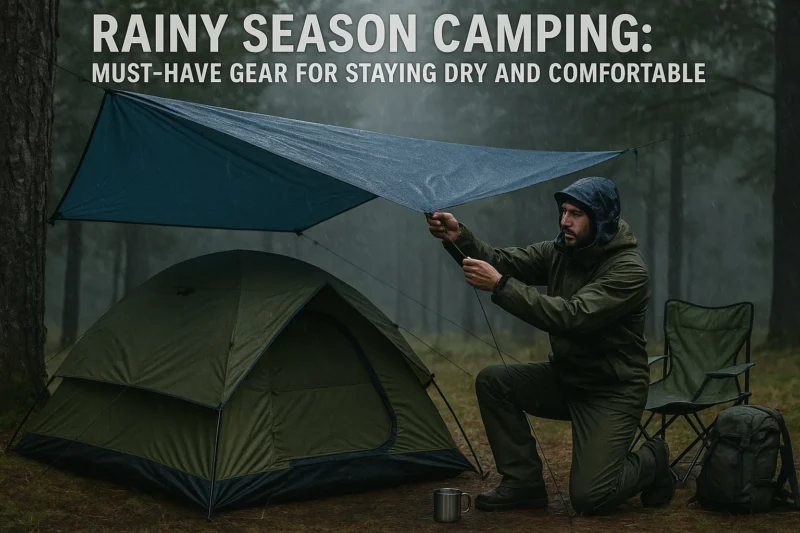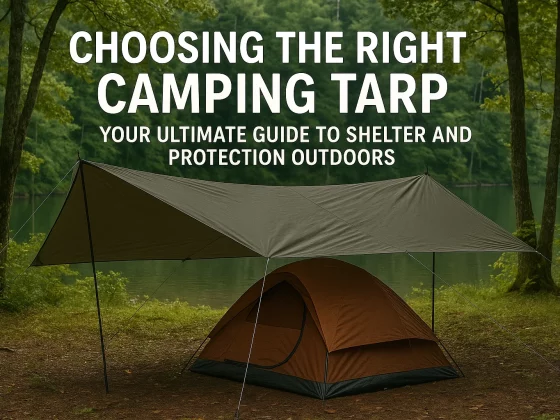For many campers, the idea of pitching a tent under clear skies and basking in sunshine is the ideal scenario. But in the Philippines, where the rainy season stretches for months, adventurers who wait only for perfect weather might find themselves indoors for much of the year. Instead of avoiding the rain, experienced campers learn to embrace it.
Camping in wet conditions offers its own charm. The sound of raindrops on leaves becomes a soothing backdrop, mist rolls over mountains with a dreamlike quality, and campfires feel cozier against damp surroundings. Yet without preparation, rain can turn magical experiences into miserable ones. Wet gear, soaked tents, and slippery trails quickly sap morale.
The secret lies in bringing the right gear and adopting strategies designed for rain. This article outlines must-have equipment, from shelters to clothing, and explores how tools like a durable camping tarp can make the difference between discomfort and enjoyment.
Choosing the Right Shelter
The first line of defense against rain is your shelter. While most tents claim to be waterproof, not all are built for extended downpours. Look for tents with:
-
Rainfly Coverage: A full-coverage rainfly prevents water from seeping through mesh walls.
-
Sealed Seams: Factory-taped seams resist leaks where fabric panels join.
-
Elevated Flooring: Bathtub-style floors stop rain from pooling inside.
Pairing your tent with a quality tarp extends protection. By rigging a camping tarp above your shelter, you create a double roof that channels water away and offers a dry entry space.
Ground Protection: Staying Dry from Below
Rain doesn’t only fall from above—it seeps from below. A groundsheet or footprint placed under the tent adds an extra layer against moisture. Ensure the groundsheet is slightly smaller than the tent floor to prevent water from pooling between the layers.
Campers can also use elevated sleeping pads or cots to stay above damp ground, keeping bedding warm and dry.
Clothing for Wet Conditions
Staying comfortable in rain hinges on clothing choices. Cotton, while popular, retains water and chills the body when wet. Instead, opt for quick-drying synthetics or lightweight wool. Essentials include:
-
Waterproof jackets with breathable membranes.
-
Ponchos that double as ground covers.
-
Lightweight, moisture-wicking base layers.
-
Extra socks kept in waterproof bags.
Layering is key. Even in tropical climates, wet conditions combined with wind can lead to unexpected chills.
Managing Campfires in the Rain
Few things lift spirits like a campfire on a rainy night. Building one requires preparation:
-
Collect wood early and store it under tarps.
-
Use fire starters like wax-coated cotton balls or commercial cubes.
-
Build fires under a raised tarp or in natural windbreaks.
A carefully set tarp not only keeps the firewood dry but also creates a communal space where campers can gather out of the rain.
Cooking in Wet Weather
Rain complicates cooking, but with adjustments, meals remain enjoyable. Portable stoves are more reliable than open fires when conditions are damp. Positioning a stove under a tarp or in a ventilated shelter ensures both safety and dryness.
Cooking gear with lids helps food stay warm longer, and insulated mugs or thermoses preserve heat in chilly conditions. Nothing beats sipping hot chocolate while listening to rain patter outside the tent.
Protecting Electronics and Essentials
Phones, cameras, and lights remain valuable tools even in the rain. Waterproof cases or dry bags keep them safe. Power banks and lighting gear should also be shielded from moisture.
Organizing essentials into waterproof pouches within your backpack ensures that even if the bag gets wet, critical items remain dry and functional.
Camp Setup Strategies
Where you pitch your tent matters as much as the gear itself. Avoid low-lying areas where water naturally collects. Instead, choose elevated ground with good drainage. Positioning tents near tree cover provides some natural protection, but beware of areas prone to falling branches during storms.
Create a communal dry zone by rigging a large tarp overhead. This becomes the heart of camp, where cooking, eating, and socializing happen in relative comfort.
Safety on Slippery Trails
Rain doesn’t just affect camp—it transforms trails. Slippery rocks, mud, and reduced visibility increase risk. Proper footwear with deep traction is essential, as are trekking poles for added stability.
Moving at a slower pace and keeping group members within sight ensures safety. Scheduling hikes for breaks in the rain, when trails are less treacherous, also reduces accidents.
Entertainment During Downtime
Rainy nights may force campers to retreat under shelter. Bringing entertainment helps pass the time:
-
Card or board games that fit easily in backpacks.
-
Journaling or sketching to reflect on the experience.
-
Group storytelling or singing sessions.
These activities keep spirits high when the weather discourages outdoor play.
Caring for Gear Post-Camping
After returning home, drying gear thoroughly is critical. Tents, tarps, and clothing stored wet can develop mildew or odors. Hanging items in a well-ventilated space restores them for the next trip. Waterproof coatings on tents and jackets should be reapplied periodically to maintain performance.
The Mental Shift: Seeing Rain as Adventure
Ultimately, rainy season camping is about mindset. Rain can feel like a barrier, but reframing it as part of the adventure changes the experience. Embracing the rhythm of rainfall, finding joy in hot meals shared under tarps, and discovering beauty in misty landscapes turn potential setbacks into highlights.
Preparedness enables this shift. With waterproof shelters, the right clothing, and a durable camping tarp, rain becomes less an enemy and more an element to embrace.
Conclusion: Dry, Comfortable, and Ready for Rain
Camping doesn’t need to pause when the skies open up. With thoughtful gear and strategies, rainy-season adventures can be as fulfilling as sunny ones. The key lies in preparation—sturdy shelters, protective clothing, and reliable cooking setups that keep spirits high.
Above all, a resilient mindset ensures the rain adds depth to the journey rather than detracting from it. Camping is about connecting with nature in all its moods, and rain is just another expression of the wilderness. By preparing wisely, adventurers transform wet conditions into an opportunity for discovery, comfort, and stories worth retelling.



